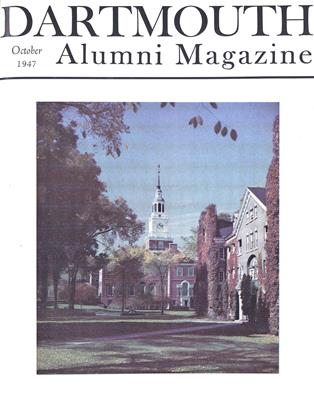By David Loughlin '43. Harper andBrothers, 1947; 242 pages; $2.50.
The most important question for each young man is: have you guts enough to com- pose a shape with meaning and charm from the confusing elements inside you and out- side? The most important question for so- ciety is: can the mechanisms that man invents be continually subordinated to the common good? And the most important question for a novelist is: can you entertain by showing possibilities of character and worth under the circumstances and within the conditions of everyday life?
Dave Loughlin's Helix is a slightly brash first book. It has the drawback of considerable technological detail which most readers will have to take on fuzzy faith. But it is a good book. It is a good book because its author has the rare courage to compose of his nature and circumstances a shape of meaning and charm. It is a good book because it shows a man in the act of establishing a creative and intelligent relation with a mechanism—the engines of a wartime cargo ship. And it is a good book because though concerned with a philosophy to accommodate the piston it is entertaining.
From page one to page 242, the language and the structure of the sentences assert an ironic and fearless readiness to take the fatal risks of responsibility without a precedent. But playfulness has no correlation with carelessness. Here is an author—a young authorwho dares to care.
The theme of Helix is freedom through the destruction of inadequate fictions and the concentration of the human spirit on practical domination of the machine. It reaffirms the faith that the spirit is greater than the machine by accepting the show-down. Though the novel ends in violent death, it provides a demonstration that the spirit can keep up the endless struggle.
 View Full Issue
View Full Issue
More From This Issue
-
 Article
Article"Enter ye in by the Narrow Gate ..."
October 1947 By ALBERT I. DICKERSON '30, -
 Article
ArticleTHE GREAT ISSUES COURSE
October 1947 By THOMAS W. BRAD EN '40 -
 Class Notes
Class Notes1918
October 1947 By ERNEST H. EARLEY, DONALD L. BARR -
 Class Notes
Class Notes1915
October 1947 By SIDNEY C. CRAWFORD, CHANDLER H. FOSTER -
 Class Notes
Class Notes1913
October 1947 By WARDE WILKINS, ROBERT O. CONANT -
 Class Notes
Class Notes1943
October 1947 By FRED F. STOCK WELL, WILLIAM T. MAECK
Sidney Cox
Books
-
 Books
BooksSHAKESPEARE'S POETICS IN RELATION TO KING LEAR.
MARCH 1963 By BENFIELD PRESSEY -
 Books
BooksBROTHERHOOD OF MEN
July 1949 By F. Cudworth Flint -
 Books
BooksMILL TOWN.
November 1954 By MALCOLM KEIR -
 Books
BooksDEMOCRACY: MAN'S GREAT OPPORTUNITY AND THE COMMON CAUSE COLLECTIVISM: MENACE OR CHALLENGE
January 1950 By Robert B. Dishman -
 Books
BooksRAIN IN THE DOORWAY
June 1933 By William A. Eddy -
 Books
BooksThe Stuff of Great Fiction
MARCH • 1985 By Young Dawkins '72






